
Stephen Ray Vaughan was an American musician, best known as the guitarist and frontman of the blues rock trio Stevie Ray Vaughan and Double Trouble. Although his mainstream career spanned only seven years, he is regarded as one of the most influential musicians in the history of blues music, and one of the greatest guitarists of all time. He was the younger brother of guitarist Jimmie Vaughan.

Texas Flood is the debut studio album by the American blues rock band Stevie Ray Vaughan and Double Trouble, released on June 13, 1983, by Epic Records. The album was named after a cover song featured on the album, "Texas Flood", which was first recorded by blues singer Larry Davis in 1958. Produced by the band and recording engineer Richard Mullen, Texas Flood was recorded in the space of three days at Jackson Browne's personal recording studio in Los Angeles. Vaughan wrote six of the album's ten tracks.
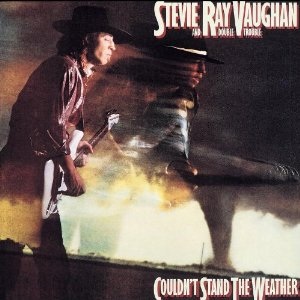
Couldn't Stand the Weather is the second studio album by American blues rock band Stevie Ray Vaughan and Double Trouble. It was released on May 15, 1984, by Epic Records as the follow-up to the band's critically and commercially successful 1983 album, Texas Flood. Recording sessions took place in January 1984 at the Power Station in New York City.

Jimmie Lawrence Vaughan Jr. is an American blues rock guitarist and singer based in Austin, Texas. He is the older brother of the late Texas blues guitarist Stevie Ray Vaughan.

Double Trouble is an American blues rock band from Austin, Texas, which served as the backing band for singer-guitarist Stevie Ray Vaughan. The group was active throughout the 1980s and contributed to reviving blues music, inspiring many later blues and rock acts. Formed in Austin, Texas in 1978, the group went through several early line-up changes before settling on a power trio consisting of Vaughan, Chris Layton (drums), Tommy Shannon (bass). They became a four-piece by 1985 after adding Reese Wynans (keyboards). Whilst with Vaughan they were billed Stevie Ray Vaughan and Double Trouble. Rooted in blues and rock music, the group worked in various genres ranging from ballads to soul, often incorporating jazz and other musical elements.
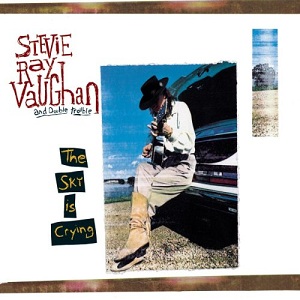
The Sky Is Crying is the fifth and final studio album by Stevie Ray Vaughan and Double Trouble, compiling songs recorded throughout most of their career. Released 14 months after Vaughan's death in 1990, the album features ten previously unreleased tracks recorded between 1984 and 1989. Only one title, "Empty Arms", appeared on any of the group's previous albums. The tracks were compiled by Vaughan's brother, Jimmie Vaughan, and was Vaughan's highest charting album at number 10.

Live at Carnegie Hall is the third live album by American blues rock band Stevie Ray Vaughan and Double Trouble, released by Epic Records in July 1997. The album consists of live selections from their sold-out October 4, 1984, benefit concert at Carnegie Hall for the T.J. Martell Foundation. Backed by a ten-piece big band for the second half of the event, Vaughan had celebrated his thirtieth birthday the night before, and called the concert his "best birthday ever, forever". The band's double-set performance, which included several blues and R&B standards, was highly successful, receiving mostly positive reviews from music critics.
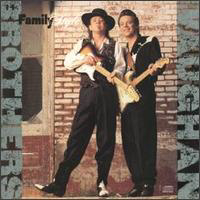
Family Style is the only studio album featuring guitarists and vocalists Jimmie and Stevie Ray Vaughan. It was released on September 25, 1990. In his early years, Stevie often remarked that he would like to do an album with his elder brother. That wish turned out to be his last studio performance, released nearly a month after his death. The liner notes end with "Thanks Mama V. for letting us play."
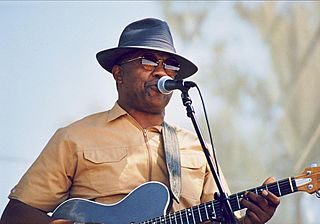
W. C. Clark is an American blues musician. He is known as the "Godfather of Austin Blues" for his influence on the Austin, Texas blues scene since the late 1960s.
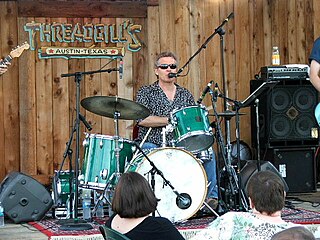
Doyle Bramhall was an American blues singer, guitarist and drummer with deep roots in the Austin, Texas music scene.
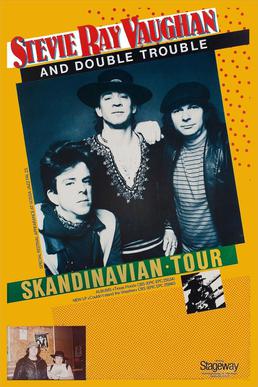
The Couldn't Stand the Weather Tour was a worldwide concert tour by blues rock band Stevie Ray Vaughan and Double Trouble. Produced in support of their 1984 album Couldn't Stand the Weather, the tour visited North America, Europe, Australasia and Japan from 1984 to 1985. To reflect the new musical direction that the group took with Couldn't Stand the Weather, the tour was aimed to differ from their past and surpass expectations of the band. In comparison to Vaughan and Double Trouble's modest stage setup from the previous Texas Flood Tour, the Couldn't Stand the Weather Tour involved a slightly more elaborate production. It utilized grander amplifier setups and sound systems to take advantage of the larger venues in which they performed. To avoid their renowned strictly blues material, Vaughan and Double Trouble embodied a more expanded and varied repertoire during performances. In disparity to the previous tour, each of the Couldn't Stand the Weather shows opened with mostly the same three songs before other material was played. The album and the tour were the beginnings of the group's mid-eighties musical development.
The Soul to Soul Tour was a concert tour through North America, Europe and Australasia, undertaken by American blues rock band Stevie Ray Vaughan and Double Trouble from 1985 through 1986. At the beginning of the tour, the band had finished recording their album Soul to Soul. Their commercial and critical acclaim had been demonstrated during the Couldn't Stand the Weather Tour in 1984, when they had played before a sold-out audience at Carnegie Hall. Longing for opportunities to expand the group's lineup, Vaughan and Double Trouble hired keyboardist Reese Wynans during the Soul to Soul recording sessions in Dallas, Texas. Throughout the tour, the band's success was confirmed as their performances consistently amazed and gratified their audiences.

The Live Alive Tour was a concert tour through North America and Europe, undertaken by Stevie Ray Vaughan and Double Trouble from 1986 to 1988. At the start of the tour, Vaughan and bassist Tommy Shannon had both achieved sobriety. Their success with overcoming long-term drug and alcohol addiction had been attained by entering a rehabilitation facility, where they stayed for four weeks. Although Vaughan was nervous about performing while sober, he received encouragement from his bandmates. Throughout the tour during performances, Vaughan would warn his audiences about the dangers of substance abuse.

The In Step Tour was a concert tour through the United States and Canada, undertaken by American blues rock band Stevie Ray Vaughan and Double Trouble from 1989 to 1990. Launched in support of their fourth and final studio album In Step, this was the third tour to include keyboardist Reese Wynans, who joined the band in 1985. Stevie Ray Vaughan and Double Trouble achieved international fame when their debut album, Texas Flood, was released in June 1983. Throughout their subsequent concert tours, the group's success was confirmed as their performances consistently amazed and gratified their audiences. Similar to their previous tours, the In Step Tour was a minimalist production. The stage featured a simple light show that changed according to the mood of certain songs performed. Although Vaughan and Double Trouble never followed a set list, all ten songs from In Step were played at least once during the tour, and as many as seven of them were included in each of the band's performances.

Dennis Edward Freeman was an American Texas and electric blues guitarist. Although he is primarily known as a guitar player, Freeman also played piano and electronic organ, both in concert and on various recordings. He worked with Stevie Ray Vaughan, Jimmie Vaughan, Bob Dylan, Angela Strehli, Lou Ann Barton, James Cotton, Taj Mahal, Barry Goldberg and Percy Sledge amongst others.

In the early morning of Monday, August 27, 1990, American musician Stevie Ray Vaughan was killed in a helicopter crash near East Troy, Wisconsin, at age 35. He was one of the most influential blues guitarists of the 1980s, described by the Rock and Roll Hall of Fame as "the second coming of the blues".
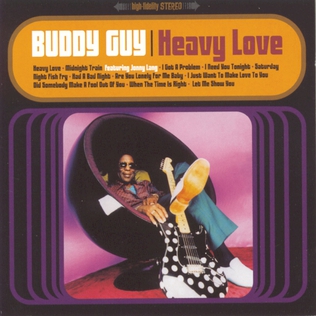
Heavy Love is an album by the American blues musician Buddy Guy, released in 1998. It was nominated for a Grammy Award for "Best Contemporary Blues Album".

A Piece of Your Soul is the second album by the American blues rock band Storyville, released in 1996. It was chosen as the album of the year at the Austin Music Awards.

Texas Sugar/Strat Magik is an album by the American musician Chris Duarte, credited to the Chris Duarte Group. It was released in 1994. Duarte promoted the album by playing shows with the Radiators, Bad Company, and Neil Zaza, among others; the Chris Duarte Group also toured Australia, Europe, and Japan.

Strange Pleasure is the first solo album by the American musician Jimmie Vaughan, released in 1994. It is dedicated to Stevie Ray Vaughan and Albert Collins. Vaughan supported the album with a North American tour, including shows with C. C. Adcock.



















